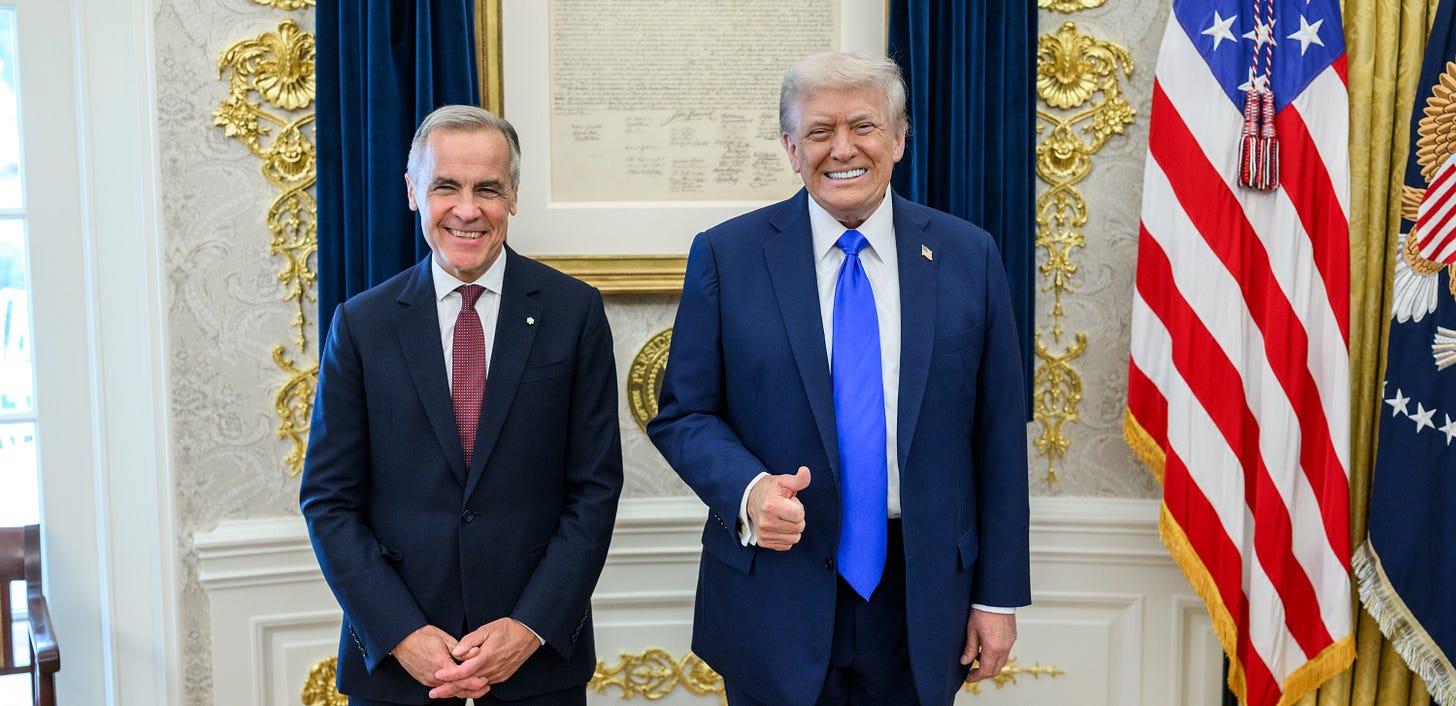Trump says Canada, U.S. have “natural conflict” ahead of Carney meeting
Amidst simmering trade tensions, U.S. President Donald Trump cited “natural conflict” between Canada and the U.S. ahead of his second meeting with Prime Minister Mark Carney.
Amidst simmering trade tensions, U.S. President Donald Trump cited “natural conflict” between Canada and the U.S. ahead of his second meeting with Prime Minister Mark Carney.
Trump added that “Canadians will love us again” once trade negotiations between him and Carney conclude.
Carney travelled to Washington on Tuesday to meet the U.S. president and restart tariff negotiations, some of which could soon increase.
Few details were presented during the Oval Office press conference ahead of their meeting. Still, Trump did say that supply management would be included in the negotiations because the new deal would “include everything.”
When asked about the upcoming CUSMA renegotiation, scheduled for next summer, Trump said separate deals could be renegotiated with each country. However, he said he had no preference regarding how it would unfold.
“I don’t care. I want to make whatever the best deal is for this country and also very much with Canada in mind,” he said.
Trump also commended Canada’s recent crackdown on drug smuggling at the border, particularly against fentanyl, noting Canada “had done a much better job than in the past.”
Asked whether the fentanyl crisis had ended, Trump responded, “No, I think it’s never going to be over, frankly.”
Carney, who barely spoke at all during the 30-minute press conference, said that any amount of fentanyl “is too much.”
“We’ve got to stamp it out,” said Carney.
The two leaders also discussed Trump’s 20-point plan for Gaza and peace between Israel and Hamas, which Carney supported.
Additionally, they touched on the idea of “working together on a golden dome for the two countries,” referring to Trump’s proposed Golden Dome missile defence system, which the U.S. president said was “going to be very important.”
When asked why Canada was the only G7 country yet to reach a tariff agreement with the U.S., Trump replied that the other countries are “not located right next to each other.”
“We don’t like to compete because we sort of hurt each other when we compete,” said Trump. “We have a natural conflict. It’s a natural business conflict, nothing wrong with it. I think we’ve come a long way with it over the last couple of months.”
Carney then spoke of the large-scale economic ties that the two countries share and that Canada is the largest foreign investor in the U.S., with plans to invest more over the coming years.
“We are the second-largest trading partner with the United States. Secondly, we are the largest foreign investor in the United States. Half a trillion dollars in the last five years alone, probably one trillion in the next five years if we get the agreement that we expect to get,” said Carney.
“I wouldn’t say ‘conflict,’ I would say compete. There are areas where we compete and it’s in those areas where we have to come to an agreement that works. But there are more areas where we are stronger together.”
Trump announced earlier this week that if no agreement were reached, additional tariffs would come into effect on Nov. 1.
Conservative Leader Pierre Poilievre released an open letter to Carney on Monday, urging him to “negotiate a win” for Canada and deliver on campaign promises to reduce tariffs and defend Canadian workers.
“You promised a deal by July 21, 2025. Still no deal,” Poilievre posted on X. “You promised to ‘negotiate a win,’ and now U.S. tariffs on Canada are twice as high as when you were elected, saying you would get rid of them.”
Poilievre also called on the prime minister to eliminate U.S. tariffs on softwood lumber, steel, aluminum, copper and automobiles.




In so many words, Trump showed Carney "who's yo daddy". NHL season started yesterday but Carney's elbows were nowhere near on display.
mark, the great negotiator… even CBC must be having trouble putting a positive spin on the lack of backbone this man has. mark is well on his way to bankrupting Canada. I wonder if this was the plan all along; to make Canada the 51st state?